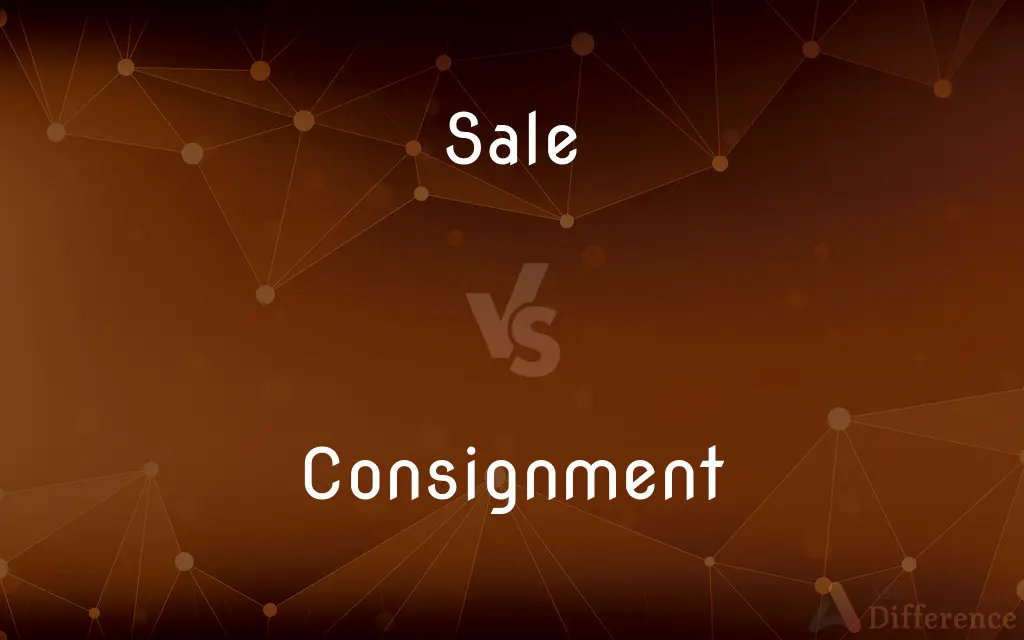Sale vs. Consignment — What's the Difference?
By Tayyaba Rehman — Updated on September 28, 2023
Sale is the act of selling goods or services, transferring ownership to the buyer for a price, while consignment is an arrangement where goods are left with a third party to sell, but ownership is retained until sold.

Difference Between Sale and Consignment
Table of Contents
ADVERTISEMENT
Key Differences
Sale and Consignment pertain to transactions and commercial arrangements but imply different conditions and mechanisms. Sale is a straightforward commercial action where goods or services are exchanged for money or other forms of payment, indicating a direct and final transfer of ownership from the seller to the buyer. The transaction is typically immediate, and once completed, the seller has no further rights to the goods, nor obligations to the buyer regarding the sold item.
Conversely, consignment is a more nuanced arrangement, wherein goods are placed in the hands of a third party—usually a retailer—to be sold. However, the ownership of the goods remains with the consignor until the items are sold. The consignee, responsible for selling the items, earns a commission upon the successful sale of the goods, returning the unsold items to the consignor. It’s a symbiotic relationship allowing the consignee to offer diverse products without purchasing stock and the consignor to reach a broader market.
In a sale, the buyer acquires immediate ownership and usually possesses the item forthwith after the transaction is completed. It’s a definitive process, marking the end of the seller’s relationship with the item. In this paradigm, the price is fixed and agreed upon by both buyer and seller, typically requiring immediate payment.
In contrast, under a consignment arrangement, the actual transfer of ownership is deferred until the item is sold to the end consumer. This allows the consignor to retain ownership and possibly reclaim the item if it doesn't sell. It's a strategy often employed to reduce risk, allowing the consignor and consignee to share the financial burden and benefits.
Summarily, while both sale and consignment are mechanisms to facilitate the circulation of goods, they operate under distinct paradigms. Sale implies an immediate and irrevocable transfer of ownership, usually uncomplicated and clear-cut. Consignment, however, involves a delayed transfer of ownership, coupled with shared risks and benefits between consignor and consignee, allowing flexibility and expanded market reach for both parties.
ADVERTISEMENT
Comparison Chart
Definition
The act of selling goods or services.
An arrangement where goods are left with a third party to sell.
Ownership
Transferred immediately to the buyer.
Retained by the consignor until goods are sold.
Payment
Usually requires immediate payment.
Payment is made after the goods are sold.
Risk
Usually borne by the buyer post-transaction.
Shared by consignor and consignee until the item is sold.
Relationship
Ends after the transaction is completed.
Continues until the consigned goods are sold.
Compare with Definitions
Sale
An event where goods are sold to the highest bidder.
The auction house organized a sale for rare collectibles.
Consignment
The delivery of goods for sale, storage, or shipment.
The retailer received a large consignment of electronic goods.
Sale
The activity or business of selling products.
The store is having a major sale this weekend.
Consignment
A batch of goods destined for sale by a third party on behalf of the owner.
The latest consignment of books included several bestsellers.
Sale
The transfer of ownership of goods from one person to another for a price.
The sale of the company was finalized last week.
Consignment
The act of consigning goods to a merchant for sale, with payment to the consignor upon sale.
The artist sent several paintings for consignment at the gallery.
Sale
The exchange of a commodity for money.
The sale of the artwork fetched a hefty price.
Consignment
Goods sent by a consignor to a consignee for sale.
The consignment of clothes arrived at the shop this morning.
Sale
A period during which a retailer sells goods at reduced prices.
The end-of-season sale attracted a multitude of shoppers.
Consignment
Consignment involves selling one's personal goods (clothing, furniture, etc.) through a third-party vendor such as a consignment store or online thrift store. The owner of the goods pays the third-party a portion of the sale for facilitating the sale.
Sale
The exchange of a commodity for money; the action of selling something
The sale has fallen through
We withdrew it from sale
Consignment
A batch of goods destined for or delivered to someone
A consignment of drugs
Sale
A period during which a shop or dealer sells goods at reduced prices
The January sales got under way this week
Consignment
The act of consigning.
Sale
The exchange of goods or services for an amount of money or its equivalent; the act of selling
The sale of such a nice house should be easy.
Consignment
Something consigned.
Sale
A selling of property to the highest bidder; an auction.
Consignment
A collection of goods to be sent, in transit or having been sent.
Sale
An offer or arrangement in which goods are sold at a discount
The store has a sale on winter coats.
Consignment
The act of consigning.
Sale
The business or activity of selling goods or services
She works in sales.
Consignment
The sale of one's own goods (clothing, furniture, etc.) through a third-party vendor, in exchange for a portion of the sale price, and with the consigner retaining ownership of the goods until they are sold or abandoned.
Sale
The number of items sold or the amount of money received for a number of items sold
Sales are better than expected.
Consignment
The act of consigning; consignation.
Sale
An exchange of goods or services for currency or credit.
He celebrated after the sale of company.
Consignment
The act of consigning or sending property to an agent or correspondent in another place, as for care, sale, etc.
Sale
Short for discount sale The sale of goods at reduced prices.
They are having a clearance sale: 50% off.
Consignment
That which is consigned; the goods or commodities sent or addressed to a consignee at one time or by one conveyance.
To increase your consignments of this valuable branch of national commerce.
Sale
The act of putting up for auction to the highest bidder.
Consignment
The writing by which anything is consigned.
Sale
(obsolete) A hall.
Consignment
Goods carried by a large vehicle
Sale
See 1st Sallow.
Consignment
The official act of consigning a person to confinement (as in a prison or mental hospital)
Sale
The act of selling; the transfer of property, or a contract to transfer the ownership of property, from one person to another for a valuable consideration, or for a price in money.
Consignment
The delivery of goods for sale or disposal
Sale
Opportunity of selling; demand; market.
They shall have ready sale for them.
Consignment
A commercial arrangement in which goods are left in the possession of another party to sell.
The store operates mainly on a consignment basis, selling products from local artisans.
Sale
Public disposal to the highest bidder, or exposure of goods in market; auction.
Sale
The general activity of selling;
They tried to boost sales
Laws limit the sale of handguns
Sale
A particular instance of selling;
He has just made his first sale
They had to complete the sale before the banks closed
Sale
The state of being purchasable; offered or exhibited for selling;
You'll find vitamin C for sale at most pharmacies
The new line of cars will soon be on sale
Sale
An occasion (usually brief) for buying at specially reduced prices;
They held a sale to reduce their inventory
I got some great bargains at their annual sale
Sale
An agreement (or contract) in which property is transferred from the seller (vendor) to the buyer (vendee) for a fixed price in money (paid or agreed to be paid by the buyer);
The salesman faxed the sales agreement to his home office
Common Curiosities
Who retains the ownership in consignment until the goods are sold?
The consignor retains ownership in consignment until the goods are sold.
When is payment made in consignment?
In consignment, payment is made after the goods are sold.
Do sales involve auctions?
Sales can involve auctions, where goods are sold to the highest bidder.
Is there a transfer of ownership in a sale?
Yes, in a sale, the ownership of goods is transferred immediately to the buyer.
Is payment immediate in a sale?
Payment is usually immediate in a sale unless credit terms are agreed upon.
Can consigned goods be returned to the consignor if unsold?
Yes, unsold consigned goods can typically be returned to the consignor.
Who bears the risk in consignment?
The risk in consignment is usually shared between the consignor and the consignee until the item is sold.
Is consignment considered a sale?
No, consignment is not a sale as the ownership is retained by the consignor until the goods are sold.
Can sale prices be reduced?
Yes, sale prices can be reduced, especially during promotional or clearance sales.
Is the relationship between buyer and seller ongoing in a sale?
No, the relationship usually ends after the transaction is completed in a sale.
Is a sale price typically fixed?
Yes, a sale price is typically fixed and agreed upon by both parties beforehand.
Can consignment goods be new or used?
Consignment goods can be either new or used.
Who determines the price of consigned goods?
The price of consigned goods is usually agreed upon by both the consignor and consignee.
Can sales be reversed?
Sales can potentially be reversed through returns or refunds, depending on the seller's policy.
Are consigned goods always sold by retailers?
Consigned goods are typically sold by retailers, but other entities like galleries or auction houses can also sell consigned goods.
Share Your Discovery

Previous Comparison
Alfredo vs. Carbonara
Next Comparison
Inhumanly vs. InhumanelyAuthor Spotlight
Written by
Tayyaba RehmanTayyaba Rehman is a distinguished writer, currently serving as a primary contributor to askdifference.com. As a researcher in semantics and etymology, Tayyaba's passion for the complexity of languages and their distinctions has found a perfect home on the platform. Tayyaba delves into the intricacies of language, distinguishing between commonly confused words and phrases, thereby providing clarity for readers worldwide.














































